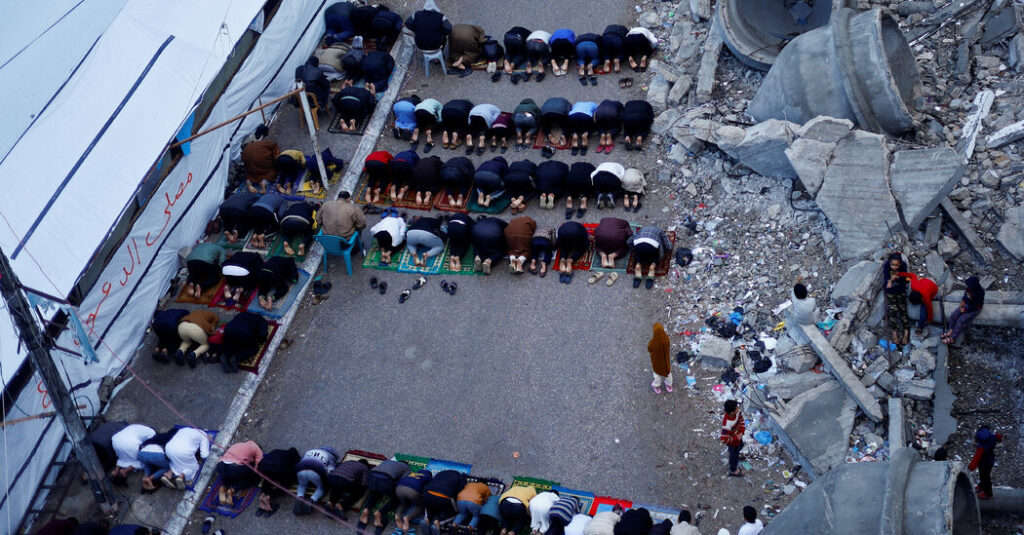
As Eid al-Fitr approached, Amani Abu Awda’s four children began asking her for new clothes and toys, festive items that Muslims typically buy to celebrate the holiday that marks the end of the holy month of Ramadan.
But the mother of four from northern Gaza is now displaced with her family in a tent in the southern city of Rafah, far from any sense of festivity and the home that once hosted large family gatherings.
“Oh God, I couldn’t get them anything because of the high prices,” he said on Saturday, days before most Muslims around the world celebrated Eid al-Fitr. “I had to go look for used clothes. On normal days, we would never buy those things. But I couldn’t even find used clothes.”
Eid al-Fitr, the three-day celebration beginning Wednesday that marks the end of the holy month of Ramadan, used to be a joyous time in Gaza. But with famine threatening Gaza amid Israel’s continuing military offensive, Palestinians say there is little to celebrate.
Ms. Abu Awda’s family managed to take some clothes with them when they fled their home in Jabaliya two months ago. But at one checkpoint, Israeli soldiers forced them to drop everything they were carrying as they walked along a dangerous road where some Palestinians had disappeared in detention and others were killed in Israeli airstrikes, she said.
“What kind of Eid is this?” Ms. Abu Awda said, adding: “We have lost a lot. We have lost family and loved ones. We have lost our homes and we have lost security. The feeling of death is with us at every moment and the smell of death is everywhere.”
More than anything, Abu Awda said, they want a ceasefire for Eid.
Just as Ramadan, a month of one-day fasts and religious observance, was marked by bittersweet memories of how it used to be observed before Israel’s war in Gaza, Eid will also be characterized by wistful comparisons about how different things were ago. just one year.
Before the war, The shopping malls would be full of families buying new clothes for the holiday and sweets to offer to all the relatives who would come to visit in the days leading up to Eid.
Now almost all of those relatives are displaced, crammed into small houses with other people or in suffocating tents made of plastic sheets.
Many Muslims in the Middle East Visit the graves of your loved ones on Eid. But with so many deaths since the war began in October and with many of them buried in makeshift graves or still to be recovered from beneath the rubble, maintaining that tradition is now impossible for most.
Gaza Ministry of Health It says more than 33,000 people have been killed in Gaza during six months of Israeli bombing.
In Gaza City, some people have hung small lights or paper decorations in the streets. But it has done little to combat the overall gloomy sentiment, said Alina Al-Yazji, a 20-year-old university student.
“The streets, instead of smelling like cookies, mamoul, sumaqia, Fasekh and all those wonderful smells,” said Ms. Al-Yazji, naming some of the traditional sweet and savory dishes eaten during Eid, “instead “The streets smell of blood.” and slaughter and destruction.”
As he spoke, the sound of an Israeli fighter jet roared overhead.
Sitting in her tent in Rafah, Muna Daloob, 50, couldn’t help but remember past holidays, before her family fled their home in Gaza City.
She said she is not making Eid cookies or mamoul or phaseekh because she does not have cooking gas and all the ingredients, including flour and sugar, are either too expensive or in short supply.
She hoped she could at least find (and afford) the smallest gift to make her grandchildren smile: a lollipop.
For Mohammad Shehada, 22, like other Palestinian men, Eid comes with the expectation of giving monetary gifts, called eidiya.
In most Muslim cultures, adults give small eidiyas to children. But Palestinians give the money to both children and their adult relatives. Even before the war, some Palestinian men in Gaza struggled to be able to give eidiya as a result of a 17-year land, air and sea blockade imposed on Gaza by Israel and supported by Egypt. Now, in the midst of war, eidiya will be almost impossible for most people.
“The joy of children gathering around you when you give them an eidiya, we won’t be able to give it this year and we will feel ashamed,” he said.
Shehada hoped that some mosques, most of which have become shelters for Gaza’s many displaced people, would still hold Eid morning prayers. She hoped to eat phaseekh, a fermented fish dish, the simplest of Eid pleasures, she said.
“I have high hopes for Eid,” he said, “but first, let them put an end to this disgusting war.”